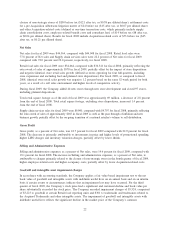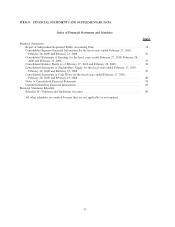Albertsons 2010 Annual Report Download - page 29
Download and view the complete annual report
Please find page 29 of the 2010 Albertsons annual report below. You can navigate through the pages in the report by either clicking on the pages listed below, or by using the keyword search tool below to find specific information within the annual report.stock as of the end of the third quarter of fiscal 2009 as well as the impact of the unprecedented decline in the
economy on the Company’s plan.
Operating Earnings (Loss)
Operating loss for fiscal 2009 was $2,157, compared with operating earnings of $1,684 for fiscal 2008. Retail
food operating loss for fiscal 2009 was $2,315, compared with operating earnings of $1,550 for fiscal 2008,
reflecting $3,524 of goodwill and intangible asset impairment charges and $162 of charges primarily related to
the closure of non-strategic stores with the remaining decrease of $179, or 52 basis points, attributable to
investments in price, higher promotional spending, higher employee-related costs and higher occupancy costs.
Supply chain services operating earnings for fiscal 2009 were $307, or 3.1 percent of Supply chain services
net sales, compared with $274, or 2.8 percent of Supply chain services net sales for fiscal 2008, primarily
reflecting improved sales leverage and cost reduction initiatives.
Net Interest Expense
Net interest expense was $622 in fiscal 2009, compared with $707 for fiscal 2008, primarily reflecting lower
debt levels and the benefit of lower borrowing rates on floating rate debt in fiscal 2009.
Provision for Income Taxes
Income tax expense was $76, or 2.7 percent of loss before income taxes, for fiscal 2009 compared with $384,
or 39.3 percent of earnings before income taxes, for fiscal 2008. The tax rate for fiscal 2009 reflects the
impact of the goodwill and intangible asset impairment charges, the majority of which are non-deductible for
income tax purposes, as well as a benefit attributable to favorable state tax items, non-taxable life insurance
proceeds and a reduction in the statutory rate.
Net Earnings (Loss)
Net loss was $2,855, or $13.51 per basic and diluted share, for fiscal 2009 compared with net earnings of
$593, or $2.80 per basic share and $2.76 per diluted share for fiscal 2008. Net loss for fiscal 2009 includes
charges of $3,470 after tax, or $16.40 per diluted share, comprised of goodwill and intangible asset impairment
charges, charges primarily related to the closure of non-strategic stores, settlement costs for a pre-Acquisition
Albertsons litigation matter and other Acquisition-related costs. Net earnings for fiscal 2008 include Acquisi-
tion-related costs of $45 after tax, or $0.21 per diluted share.
CRITICAL ACCOUNTING POLICIES
The preparation of consolidated financial statements in conformity with accounting standards requires
management to make estimates and assumptions that affect the reported amounts of assets and liabilities and
disclosure of contingent assets and liabilities as of the date of the financial statements and the reported
amounts of revenues and expenses during the reporting period. Actual results could differ from those
estimates.
Significant accounting policies are discussed in Note 1—The Company and Summary of Significant Account-
ing Policies in the Notes to Consolidated Financial Statements included in Part II, Item 8 of this Annual
Report on Form 10-K. Management believes the following critical accounting policies reflect its more
subjective or complex judgments and estimates used in the preparation of the Company’s consolidated
financial statements.
23
























